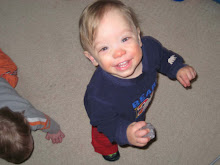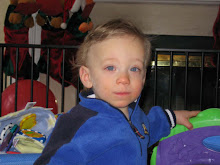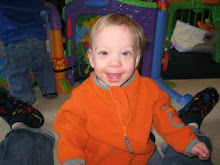A fellow triplet mommy went to a discussion with the author of a book called, "Allow Your Child to Fail if You Want Your Child to Succeed." The author is a pediatrician, Dr. Avril Beckford, and gave a great talk.
My friend emailed some great insights from the discussion, and I wanted to share some of her main points with all of you. Thanks, Kim -- this truly was eye opening!!!
The author began with the analogy of childhood as a bridge that we help our children to cross until adulthood. We put up barriers to keep them safe, and lead them across the bridge. The news today is filled with stories of parents who aren't putting up barriers and their kids fall off that bridge into drugs, gangs, etc, etc.
However, she feels that an even bigger problem is occurring outside of those who put up no barriers ... those of us who are carrying our kids across the bridge (helicopter parents).
Her main points were that children of parents who want to get it "right" are being damaged in the same way the parents who don't put up the barriers on the bridge. She said that children are:
(1) Over-Pressured
(2) Over-Scheduled
(3) Over-Protected
(4) Under-Nurtured
(4) Over-Indulged
(5) Micro-Managed
(6) Over-Praised
(1) Over-Pressured: Parents are pressuring children to perform at earlier and earlier ages ... through things like competitive sports before the age of 8, getting into the best schools, doing learning videos, and labeling (my smart child, my dancer, my bully). Instead we should be getting kids together and having fun play with the soccer net, while mom and dad play goalie and act silly. Find the fun first and THEN the competition.
And this is not for every kid, some kids crave competition and they need it, but they are not the norm. (Starting too early= Young burnout)
Instead of saying, "You are my Mensa genius", we should say, "We sure had fun reading that book today."
Play makes brains grow more than anything. LOTS more goofy backyard play ... Get DOWN and DIRTY with your kids (play touch, feel, and laugh). Its okay for your kids to eat dirt, play in the mud, and fall down.
(2) Over-Scheduled: FREE PLAY, FREE PLAY, FREE PLAY. At two your child should not be involved in more than ONE scheduled activity (dance, t-ball, etc).
Also watch over scheduling fun stuff ... personally, I'm so guilty of this!
(3) Over-Protected: DON'T fix your kids problems.
Example: Your kid comes to you with math homework: "Mom, I can't figure this out. I can get to here, but this is as far as I can get." Instead of finishing it with your child, your child has to go to school with as much done as possible and ask the teacher for help.
And don't ever do a project for your child, teachers know and don't grade your kids as highly as they would a kid who did it on their own.
When we bail our children out, we hinder their learning. Resist the urge to rescue your child.
Another Example: Bullying ... Dr. Avril, teaches little bitty kids in her office to stand up, put their hand out in a stop sign, and say in a loud voice: "STOP BULLYING ME!" That way the kid is handling the problem, while alerting the teacher to the problem and the teacher can then intervene. But the child is in control.
(4) Under-Nurtured: Only 1/3 of American teens have two or more dinners at home per week. Quality time is NOT a replace for actual time. Eat five meals per week as a family.
Technology, cell phones, and video games: PUT THEM DOWN (especially the parents -- yes, I'm talking to you Dan. YP).
We are missing too many important moments, because our ears are glued to our cell phone or on our computers. We are missing our children's excitement for a new skill, a hand print painting, or a really BAD day.
(5) Over-Indulge: If our children get to the point that they feel they are entitled to stuff (candy every time we go to the store, the biggest best car and a new one the day after they wreck it, etc, etc) we are creating an injustice.
There is an actual labeled syndrome for this now, because it is gotten so out of hand, "spoiled child syndrome".
(6) Micro-Managed: DON'T control every aspect of your kids life.
Don't referee (easy to say, harder to do). Instead of saying "Don't hit your brother", say, "Why are you hitting your brother, and how can we fix it, so you don't have to hit him." Don't stop your sibling groups from fighting, unless someone is going to get hurt. They will come to you when it gets to bad and THEN you intervene, but not before.
Also, choices are great for kids. If you can, give them a choice that you can live with (two veggies, must eat one ... draw during playtime or use play dough).
(7) Over-Praised: Parents must STOP over praising kids for the littlest things (I'm SO bad at this -- we clap after singing the Alphabet Song!).
Potty training dances, treats, etc need to stop ... Instead say, "Good job -- let me help you wipe." That way the kids don't learn to control parents with their bowel moments ..."I need to potty" stops everything, when they are capable of holding it!
Bumper stickers: My child got all A's at "so and so middle school". What are we telling our kids: ONLY A's matter? If that kid was like me, she got A's without opening a book. What about the kid who works her rear end off to get a 72? What's more important: the work or the A?
Something to think about: Kids grow up thinking everything they do should be praised and then they hit college or the work force and they can't function because their boss or professor is not raving over the MINIMUM they do.
Dr. Avril also suggested three other books that are great reads:
I LOVE U 65 BULLDOZERS (her children's book-illustrated by an autistic child)
I LOVE YOU THE PURPLEST (great book for multiples)
HOW TO TALK SO YOUR CHILD WILL LISTEN. HOW TO LISTEN SO YOUR CHILD WILL TALK.
Finally, Dr. Avril gave a simple RX for a healthy, happy child:
* Allow and be comfortable with MISTAKES -- they are essential to learning and to personal growth
* Allow failure -- if we don't fail at some attempts we haven't stretched our self far enough
* Don't negotiate from your child ... LIFE IS NOT FAIR and you can't make it be fair for them!
* Role model how to learn from failure and mistakes -- Instead of cursing at yourself when you drop a bag of flour, instead laugh at yourself and say, "Look how silly mommy is ... she dropped the flour. Oh well, everyone makes mistakes!"
* Don't expect PERFECTION (this is reeeeaaaallly hard for me) -- that pressure is recipe for disaster. Expect and treasure bumps in the road, because mistakes are good and healthy.
* Partner with your child's teacher -- Don't demand things from them when your kids is having problems, instead work together from the beginning.
* Be there when your child succeeds, but ESPECIALLY WHEN THEY FAIL!
* Know your child well ... be attuned to who they are.
* Treasure and appreciate who they are as an individual (so important for multiples)
* Listen to their feelings
* CHILL, RELAX, and ENJOY your children
* LAUGH and LAUGH and LAUGH some more
* LOVE YOUR CHILDREN UNCONDITIONALLY! !!
Friday, June 12, 2009
Subscribe to:
Post Comments (Atom)











2 comments:
sounds like great advice. And - it works for me because I have great mommy guilt over the fact that I don't have Clara in a dance class or gym class or anything like that. Maybe our daily trip to the park isn't such a bad thing...
It's all good advice but I wonder if the constant barrage of criticism of parents isn't also a form of pressure on us. I think that parents today are doing a lot of things RIGHT! For example, being involved with your child, watching out for her,finding activities that she enjoys, being sensitive to her feelings and helping her sort through them -- supporting her as she goes through life -- is VERY GOOD! I know that praising parents and saying that they're doing an even better job than the previous generation, that their caring and protectiveness are normal natural and good isn't sexy and doesn't sell books or attract people to newspapers and tv. But a bit of cheerleading for all the things that moms and dads do right today would be more accurate than the torrent of criticism (helicopetering! overscheduling! living through our kids! narcissistic!) you hear. Are MOST kids overscheduled? NO. Most parents are sensitive to their kids' stress and their own stress too. Let's cheer for all these sensible parents!
Kathy Seal
Coauthor, Pressured Parents, Stressed-out Kids: Dealing With Competition While Raising a Successful Child
Post a Comment